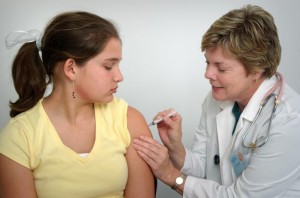 A study came out in Pediatrics last week that looked at how vaccine exemptions were related to a statewide outbreak of pertussis (also known as whooping cough) in California in 2010. As you might expect, the authors found that there were more whooping cough cases in areas with higher rates of vaccine exemptions.
A study came out in Pediatrics last week that looked at how vaccine exemptions were related to a statewide outbreak of pertussis (also known as whooping cough) in California in 2010. As you might expect, the authors found that there were more whooping cough cases in areas with higher rates of vaccine exemptions.
These findings were true even when the authors controlled for certain demographic factors like race/ethnicity, population density, family size, education level, and household income. Findings of this study underscore the need for everyone to be vaccinated in order to prevent personal risk of getting vaccine-preventable diseases, and to prevent passing these diseases along to those who are too young or not able to be vaccinated.










Director Humble–
Again, I am asking you why the AZDHS definition of a pertussis outbreak in a school setting (3 cases in 21 days) is different from the CDC definition of 2 cases in 42 days. I ask this because we continue to have mounting cases of pertussis in SE Tucson and schools that would have required invocation of the last part of ARS 15-873 if the CDC definition were used are “skipping by” because you are using a different definition. There has been pertussis in the schools here since August and the rate appears to be accelerating and as a pediatrician I would like to see more done to help stop this outbreak.
Chris Hickie, MD, PhD, November 9th, 2013.
Dr. Hickie,
I agree with you. I am,however, wondering if there is a strain of pertussis against which the current vaccine is ineffective. In australia, there is research indicating that this hypothesis may have merit. As you know there are a number of factors contributing to pertussis outbreaks(failure to vaccinate, vaccine failure,waning vaccine protection,etc). I think that it’s plausible to conclude that the new strain is contributing to the record number of pertussis cases nationwide. What do you say about this?
Community pertussis outbreaks are often seen in a cyclical fashion, every 3-4 years. As you mentioned, the occurrence of these outbreaks has been attributed to inadequate age-appropriate vaccination, waning immunity, and a pertussis vaccine that is not 100% effective.
Regarding a new pertussis strain, CDC has reported that some pertussis isolates in the United States have lost pertactin, a key antigen component of the acellular pertussis vaccine. They are continuing to monitor this strain, but it appears that the acellular pertussis vaccine is still effective against it, since other components of the vaccines provide protection. Vaccines are still the safest and most effective tool we have for preventing pertussis.